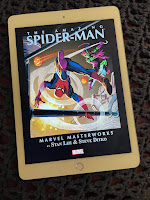
I picked up Patricia Highsmith's
The Price
of Salt on my Kindle because of all the praise the film
Carol, an adaptation of the novel, received at the 2015 Cannes Film
Festival. Feeling a little impatient that I'd have to wait several months for
the general release of the film, I figured in the meantime I could at least
grab up the book that provided the source material. And, in the end, I'm glad I
did, as it was a thoughtful and enjoyable reading experience. Here are a few
quick observations:
While the book ultimately is a lesbian love
story, it takes its time with this aspect, with the first two-thirds of the
book basically describing an intense friendship. Interestingly, this was
probably due to the 1950's setting. I'm wondering if many lesbians during that
period didn't even realize they were lesbians at first, because there wasn't
yet an easily recognizable social structure in place that included gay and
lesbian relationships as a perfectly respectable category to place oneself.
I liked the fact that Highsmith, who was a very
popular writer of hard-edged thrillers at the time (
Strangers on a
Train,
The Talented Mr. Ripley) didn't work too hard to
convince us to like the sophisticated, often aloof Carol character as much as
young Therese does. It was enough for the author to credibly and believably
show us that Therese did so.
I also liked that the young Therese, even as she
was experiencing a new sexual awakening as the story progressed, still
maintained affection, and some attraction, for some of the young men in her
sphere. In doing that, the book intelligently demonstrated that life can be
messy and complex at times. Therese was discovering herself, yes, but it didn't
mean all her past feelings were misguided or a lie.
Though not intended as such when it was written,
the book also functions as a fascinating little time capsule about life in the
1950's. It was fun to read about how people of various social standings lived,
worked, and played in 1950's New York City and its environs. And during Carol
and Therese's road trip, we get to see 1950's life in other parts of the
country, as well. You'll probably smile at how involved it was to make or
receive a long-distance phone call back then!
Some parts of the book were a little poetic and
abstract for my taste, though others might like them. For instance, Therese
gains an intense insight about Carol when she views an old painting in a
library, a stodgy posed portrait depicting someone who coincidentally looks very much like
Carol. I'm still not sure what the insight was, or why an old painting would
induce it, but it was a very big deal for Therese when it occurred. Perhaps
someone can enlighten me on what that was all about. Thankfully, for me at least,
these abstract, vaguely-described moments don't overwhelm the book by any
means.
Several times during the book, I came up with my
own motivations for the characters' actions, sometimes quite different from the
ones Highsmith relates to us. This was probably due to the nicely complex
characters and situations. For example, near the end, Therese feels estranged
from Carol and goes to a cocktail party with her theatre colleagues. There she
meets a famous stage actress and there's an obvious mutual attraction. Therese
weighs things for a moment and then rejects the attraction to the actress,
because, as related by Highsmith, Therese realized it would be no more than a
superficial relationship if she pursued it, and realizes she'd rather salvage
the deep and meaningful relationship she had with Carol. That was fine, but I
also came up with this: Therese had put distance between herself and Carol
because she was in part trying to distance herself from her inconvenient
discoveries about her sexuality, but when that sexuality reared itself up again
when she found herself attracted to the actress, she probably admitted to
herself that her attraction to women would now always be an overt part of her,
so she might as well go back to the one woman she really cared about and
embrace the whole thing. Anyway, that was a take that occurred to me.
I'll stop now, as there are plenty of other
reviews out there (at Amazon alone) if more details and opinions about this interesting little book
are desired. I'll just add that I'm very glad I read this off-the-beaten-track
novel (an off-the-beaten track novel for me, anyway, as you can see from the types of books I usually review at this site) and that I'm looking forward to the film even more now.





